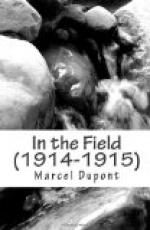At last we debouched into our trenches, where our predecessors were impatiently waiting for us. Two days and two nights is a long time to go without sleeping, without washing, without having any other view than the walls of earth that shut you in. They were all eager to go back over the same road they had come by two days before, to get to their horses again, their quarters, their friends—in short, their home. So we found them quite ready to go, blankets rolled up and slung over their shoulders, and knapsacks in their places under their cloaks.
Whilst the non-commissioned officers of each squadron went to relieve the men at the listening posts, I brushed past the men lined up against the wall, and went towards the “solitary tree,” which seemed to be stretching out its gaunt arms to protect our retreat. I had to turn to the right in a narrow passage which went round the tree, and ended in three steep steps cut in the earth, down which I had to go to reach the dug-out.
My old friend La G. was waiting for me at the bottom of this den, stretched on two chairs, warming his feet at a tiny iron stove perched upon a heap of bricks. By the light of the one candle he looked imposing and serious. His tawny beard, which he had allowed to grow since the war, spread like a fan over his chest, and gave him a look of Henri IV. I knew that this formidable exterior concealed the merriest companion and the most delightful sly joker that ever lived. So I was not much impressed by his thoughtful brow and his dreamy eye.
“Well, what’s the news?” I asked.
“We are all freezing,” he replied.
I rather suspected it. Besides this fact, which we had discovered before him, La G. could only confirm what the infantry captain had told me shortly before:
“You are going to have a most restful night, my dear fellow; and I advise you to have a Christmas manger arranged at the foot of the ‘solitary tree,’ and at midnight to sing ‘Christians, awake,’ in chorus.... We know some hymns as well as the Germans.”
I had no lack of desire to put this proposal into action, but such pious customs as these would not perhaps have been quite in harmony with the tactical ideas of our commanding officer. Still I promised La G. I would do my best for the realisation of his dream.
“Good-bye and good luck!” he said.
“Good-bye,” I replied.
And he went away into the darkness. At the end of the little passage that led to the trench I could see the men who had just been relieved passing in single file going towards the communication trench by which we had come. Their dark forms defiled in closely and rapidly. Having completed their task, they were happy to be free to get back to their squadrons, and as they passed they cracked their jokes at the others who had to stay. These answered back, but not in the most amiable manner. Then, little by little, silence settled down upon the scene. Every man was at his post: some kept watch, others walked about at the bottom of the trench or busied themselves with repairing or improving the indifferent shelters their predecessors had left them.




